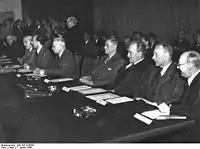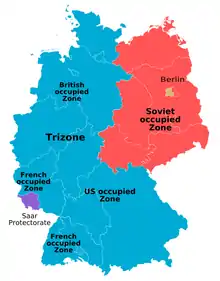Frankfurt Documents
The Frankfurt Documents are a series of documents which were an important step towards the founding of the Federal Republic of Germany.

On July 1, 1948 the representatives of the Western allied occupation forces handed over a number of documents to the prime ministers and two ruling mayors of the western zones of occupation. The documents contained recommendations for establishing a West German state. The main problem with these recommendations was that they did not provide an all-German solution, but only a West German state. The Frankfurt Documents formed a working basis for the Basic Law for the Federal Republic of Germany. They were created at the London 6-Power Conference in early 1948.
The handover took place at the IG Farben Building in Frankfurt am Main, and the documents took the name of this town. The military governors Lucius D. Clay (United States), Marie-Pierre Koenig (France) and Sir Brian Robertson (UK) issued an order establishing a western German state. Present were Peter Altmeier (Rhineland-Palatinate), Karl Arnold (North Rhine-Westphalia), Lawrence Bock (Württemberg-Hohenzollern), Max Brauer (Hamburg), Hans Ehard (Bavaria), Wilhelm Kaisen (Bremen), Hinrich Wilhelm Kopf (Lower Saxony), Hermann Lüdemann (Schleswig-Holstein), Reinhold Maier (Württemberg-Baden), Christian Stock (Hessen) and Leo Wohleb (Baden).
A West German state was to be established under the following conditions:

- There should be a constitutional convention (German: Verfassunggebende Versammlung, literally, "Constituent Assembly") before September 1, 1948, to draft a constitution shaping a federal form of government, while maintaining the rights of people and the participating states.
- This constitution should first be approved by the military governments, followed by a referendum in the states to ratify the Constitution.
- The respective simple majority in two thirds of eleven West German states should be sufficient for ratification.
- Constitutional amendments must be approved by the military governors.
- German foreign policy should continue to be controlled by the military governors in a minimum, as Ruhr questions, repairs, industrial and rights of the Allied forces.
- The boundaries of each state should be reviewed and should, if necessary, take into account traditional forms if new states were created. No state should be allowed to be too large and dominate the others.
The Frankfurt Documents prompted the Prime Minister to hold the Rittersturz Conference in Koblenz, on the resolutions that were passed.
